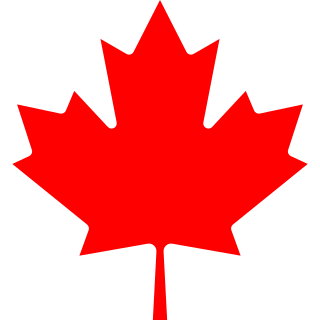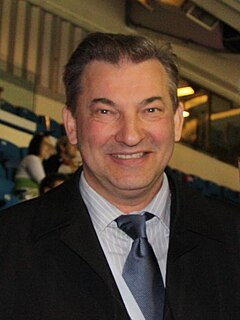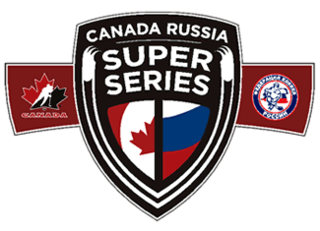
The World Cup of Hockey is an international ice hockey tournament. Inaugurated in 1996, it is the successor to the Canada Cup, which ran from 1976 to 1991 and was the first international hockey championship to allow nations to field their top players. The World Cup has occurred thrice before on an irregular basis, with the United States winning in 1996 and Canada winning in 2004 and 2016. Following the 2016 tournament, it is uncertain if the series will continue, with the 2020 tournament being cancelled.

The Canada Cup was an invitational international ice hockey tournament held on five occasions between 1976 and 1991. The tournament was created to meet demand for a true world championship that allowed the best players from participating nations to compete regardless of their status as professional or amateur. It was sanctioned by the International Ice Hockey Federation, Hockey Canada and the National Hockey League. Canada won the tournament four times, while the Soviet Union captured the championship once. It was succeeded by the World Cup of Hockey in 1996.

The Canadian national men's ice hockey team is the ice hockey team representing Canada internationally. The team is overseen by Hockey Canada, a member of the International Ice Hockey Federation. From 1920 until 1963, Canada's international representation was by senior amateur club teams. Canada's national men's team was founded in 1963 by Father David Bauer as a part of the Canadian Amateur Hockey Association, playing out of the University of British Columbia.
The nickname "Team Canada" was first used for the 1972 Summit Series and has been frequently used to refer to the Canadian national team ever since.

Vladislav Aleksandrovich Tretiak, MSM is a Russian former goaltender for the Soviet Union national ice hockey team. Considered to be one of the greatest goaltenders in the history of the sport, he was voted one of six players to the International Ice Hockey Federation's (IIHF) Centennial All-Star Team in a poll conducted by a group of 56 experts from 16 countries. He is the current president of the Ice Hockey Federation of Russia and was the general manager of the Russian 2010 Winter Olympic team.

The Soviet national ice hockey team was the national ice hockey team of the Soviet Union. The team won nearly every world championship and Olympic tournament between 1954 and 1991 and never failed to medal in any International Ice Hockey Federation (IIHF) tournament they competed in.
The men's ice hockey tournament at the 1972 Winter Olympics in Sapporo, Japan, was the 12th Olympic Championship. Games were held at the Makomanai Ice Arena and at the Tsukisamu Indoor Skating Rink. The Soviet Union won its fourth gold medal. The United States won the silver, while Czechoslovakia won the bronze. Canada did not send a team to the event for the first time since ice hockey was first competed at the Olympics in 1920, instead competing with and defeating the Soviets in a competition later that year known as the Summit Series. Canada would not send a men's hockey team to the Olympics until 1980.
The 1972–73 NHL season was the 56th season of the National Hockey League. Sixteen teams each played 78 games. Two new teams, the New York Islanders and the Atlanta Flames, made their debuts. The Montreal Canadiens won the Stanley Cup by beating the Chicago Black Hawks four games to two in the Stanley Cup Final.

The 1976 Canada Cup was an international ice hockey tournament held September 2–15, 1976, in Ottawa, Toronto, Montreal, Winnipeg and Quebec City, Canada as well as in Philadelphia, United States. It was the first of five Canada Cup tournaments held between 1976 and 1991, organized by Alan Eagleson, and sanctioned by the International Ice Hockey Federation (IIHF), Hockey Canada and the National Hockey League (NHL).
The Flyers–Red Army game was a famous international ice hockey game played on January 11, 1976, between the Philadelphia Flyers of the North America-based National Hockey League (NHL), and HC CSKA Moscow of the Soviet Union.
Professional ice hockey has existed since the early 1900s (decade). The professional game originated in the United States in 1904 and became prominent in Canada during the early 20th century before expanding back into the United States and eventually to many other countries. In addition to the United States and Canada, high-level professional hockey is present in Germany, Russia, Sweden, the Czech Republic, Slovakia, Finland and Switzerland; professional hockey is also played in many other countries, as diverse as Ukraine, the United Kingdom, Austria, Australia and Japan.

The Canadian men's national under-20 ice hockey team is the ice hockey team representing Canada internationally in under-20 competition. Their primary participation in this age group comes at the International Ice Hockey Federation's World Junior Championship, held annually every December and January. The team also participates in various exhibition matches and occasional exhibition series, such as the 2007 Super Series against their Russian counterparts, an eight-game exhibition series commemorating the 35th anniversary of the 1972 Summit Series.

The Punch-up in Piestany was a bench-clearing brawl between Canada and the Soviet Union, during the final game of the 1987 World Junior Ice Hockey Championships in Piešťany, Czechoslovakia, on January 4, 1987. The incident resulted in the ejection of both nations, and while the Soviets had already been eliminated from medal contention, the disqualification cost Canada a medal – potentially the gold. The brawl is famous for officials having turned off the arena lights in a desperate attempt at ending the 20-minute melee. Much of the blame was placed on Norwegian referee Hans Rønning, who had been selected for the game based on his perceived neutrality rather than experience.

Boris Pavlovich Kulagin was a Russian ice hockey player and coach. Kulagin was one of the first players in the Soviet Union to play organized ice hockey in the 1940s. Prior to this time Kulagin played bandy or "Russian hockey". Kulagin would later coach teams in the Soviet Union, eventually becoming national team coach in the 1970s.

Ice hockey in Canada dates back to the 19th century. The sport is very popular and played year-round and at every level. Born of various influences from stick-and-ball games brought from the United Kingdom and indigenous games, the contemporary sport of ice hockey originated in Montreal. It is the official national winter sport of Canada and is widely considered Canada's national pastime, with high levels of participation by children, men and women at various levels of competition.

Andrey Vasilyevich Starovoytov was a Soviet ice hockey administrator, referee and player. He won three Soviet ice hockey championships as a player, and was later an ice hockey referee at eight World Championships. He was the general secretary of the Soviet Union Ice Hockey Federation for 17 years, and negotiated Soviet participation in the Summit Series. He was posthumously inducted into the IIHF Hall of Fame.













